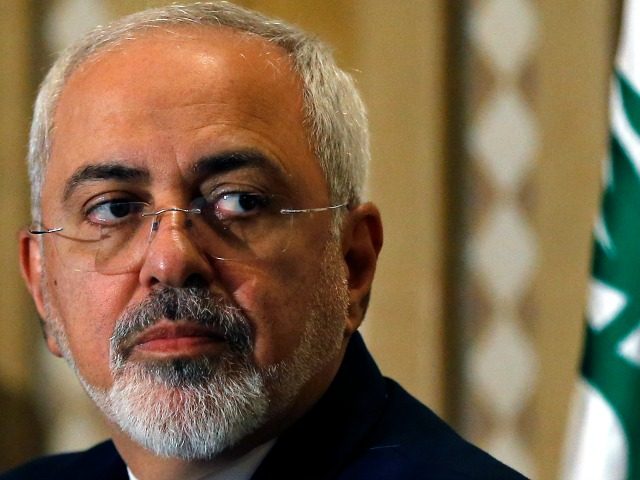Iranian Foreign Minister Mohammed Javad Zarif said during an interview with Politico that President Trump’s “posturing,” “publicity stunts,” use of “alternative facts,” and “insulting” speech to the U.N. General Assembly have put Iran in a stronger diplomatic position than ever by destroying the credibility of the United States.
“Spend an hour with Zarif, the American-educated diplomat who brokered the agreement two years ago with Barack Obama’s administration and five other major world powers, and it’s clear that he thinks Iran bested Trump at the U.N. over the past couple weeks,” Politico summarizes. “After all, Trump publicly widened the rift with European allies even as his Secretary of State Rex Tillerson failed to persuade them privately – or even make a coherent case—for blowing up the nuclear accord, potentially doing long-term damage to the U.S. ability to cut deals with any number of global bad actors.”
Zarif certainly does not seem to think that failure reflects badly on Tillerson, and neither does Politico, quoting anonymous sources who portray the secretary of state as an “increasingly isolated” voice in favor of re-certifying Iranian compliance with the nuclear deal, formally known as the Joint Comprehensive Plan of Action (JCPOA).
It turns out he is not that isolated after all, as Secretary of Defense James Mattis and Joint Chiefs Chairman General Joseph Dunford advised the Senate Armed Services Committee to stick with the deal on Tuesday. Nevertheless, the situation conveyed by Politico’s sources is that President Trump wants to withdraw from the deal as part of a broader strategy to reduce Iranian influence across the Middle East.
That is obviously not a turn of events Iran desires, so Zarif hit Trump from every angle—suggesting he could walk back from his campaign promises to scuttle the deal, advising Congress to undermine the president if he tries to decertify, and calling on U.S. allies to pressure Trump to stay in the JCPOA. He also said, not for the first time, that Iran would consider working with European nations to keep the deal alive even if the U.S. backs out.
“Look at the message that you are sending to the world. It would make it tougher for anybody to believe and rely upon the United States—anybody, not just North Korea. You’ve seen U.S. allies saying that the United States is not a reliable partner,” said Zarif, who also blasted Trump for his “frightening” rhetoric toward Iran’s friends in North Korea.
Politico gives Zarif and his boss, President Hassan Rouhani, enormous credit for avoiding North Korean-style threats and apocalyptic rhetoric, having somehow missed all those Iranian officials, including Rouhani himself, who threatened to start pumping out weapons-grade uranium within hours of the United States imposing any further sanctions. Furthermore, top Iranian military officers feel free to threaten attacks on U.S. military bases and promise to “turn Tel Aviv and Haifa into dust.”
One of the key criticisms leveled against the JCPOA is that it gave Iran money, prestige, and protection from all punitive measures in exchange for a rather brief delay in its nuclear weapons program. Zarif’s interview further validates that critique. The Obama administration was foolish to give Iran so much in exchange for so little, creating a situation that would restrain U.S. policymakers far more than Tehran.
Later in the interview, as other topics were broached, Politico found Zarif evasive about Iran’s actions in Syria, its refusal to condemn dictator Bashar Assad for using chemical weapons, and its zeal for developing long-range ballistic missiles. On the latter point, Iran thinks the JCPOA blocks the United States from taking any punitive actions against its missile program, but also insists the JCPOA does not restrain its development of long-range missiles in any way.
Iran’s missile program may yet spell the demise of the JCPOA, depending on how carefully Obama’s team worked to give the store away to Iran while hiding the details from the American people and their representatives.
The Security Studies Group notes that a much-debated provision of the deal requires Iran to abide by “all related technical or additional agreements,” which it very clearly is not doing, on counts ranging from arms sales to ballistic missile research. Under this provision, President Trump would have a very strong case for informing Congress that Iran is not in full compliance with the JCPOA.
The problem is that Obama officials are muttering the provision is effectively meaningless, deliberately sabotaged by the American side of the negotiations to make the deal seem much tougher on Iran that it actually was. To keep things nice and murky, key documents related to the JCPOA were made highly classified, effectively barring Congress from debating important provisions of the agreement.
All sorts of nasty surprises have come tumbling out of the Obama administration’s secret vaults in the years since the JCPOA went into effect, including the permission to retain the advanced uranium enrichment technology that makes Rouhani’s threats to resume weapons development in a matter of days or weeks credible.
At the moment, it is effectively impossible for the public to know whether Iran’s defiance of U.N. Security Council resolutions on missile development is a hard trigger for scuttling the JCPOA. “Iran, for its part, asserts both that ballistic missile tests do not violate the deal, and also that it will not and cannot lawfully be bound by a UN Security Council Resolution in any case,” the Security Studies Group writes.
Whatever flaws may be found in President Trump’s approach to the Iran deal, he is hardly the first party to bring “posturing,” “alternative facts,” and “publicity stunts” to the case.

COMMENTS
Please let us know if you're having issues with commenting.